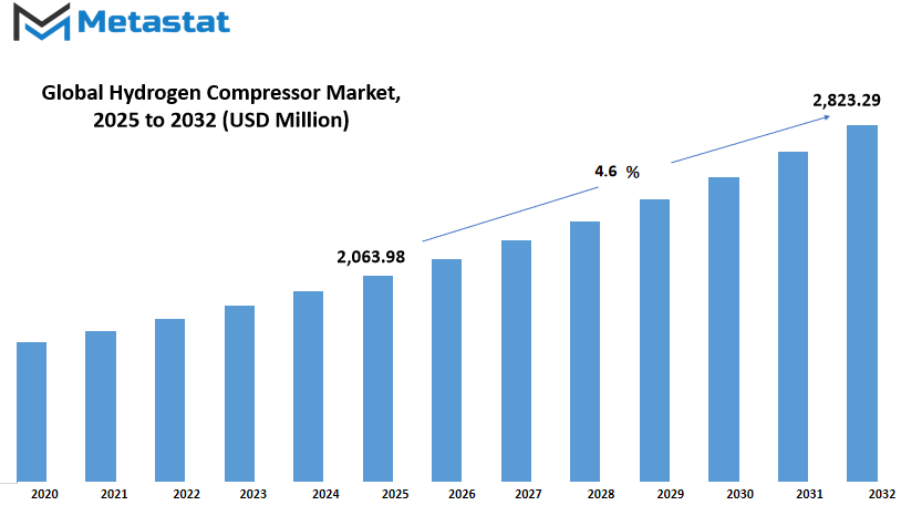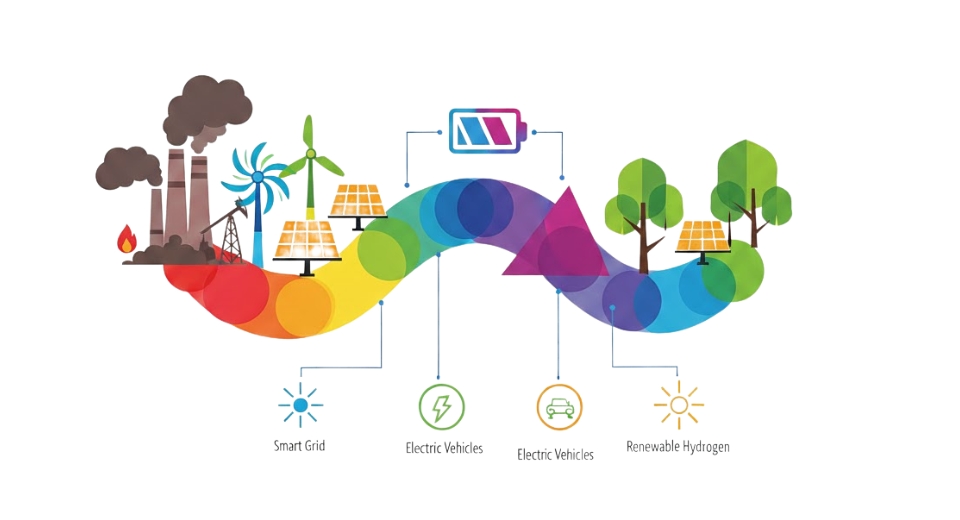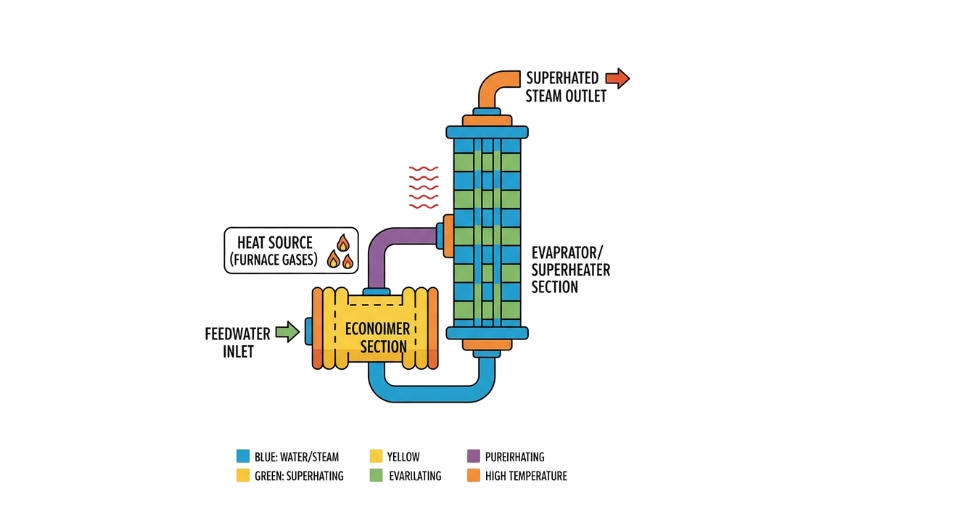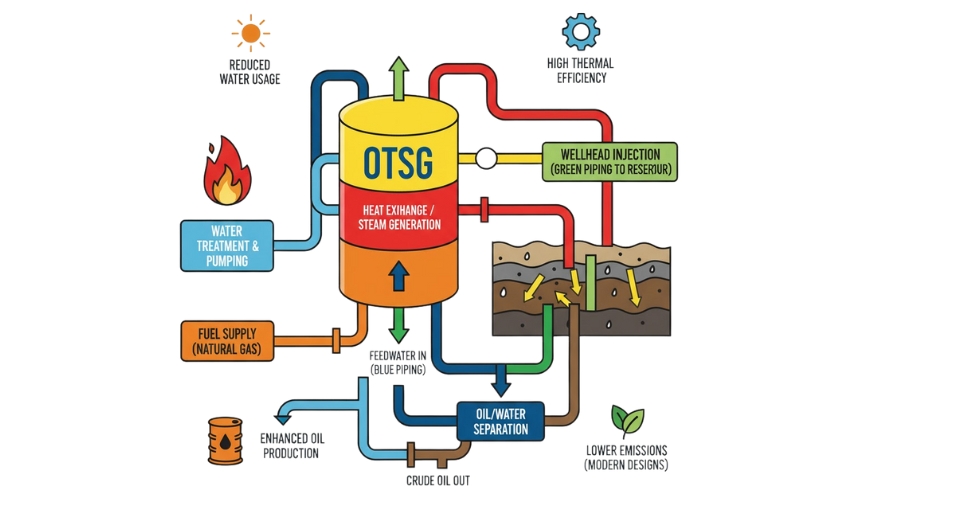MARKET OVERVIEW
The global hydrogen compressor market is a niche part of the energy and industrial equipment sector that will increasingly find form as hydrogen becomes increasingly key to contemporary energy policy. Essentially, this market will involve the manufacture, production, and sales of compressors that are specifically designed for hydrogen, a gas that presents special challenges due to its size as a molecule and its potential for flammability. These compressors cannot be used interchangeably with devices for other gases, since hydrogen has a combination of pressure control, leakage prevention, and endurance that only specialized systems can offer.
The significance of this market will be its linkage to hydrogen's wider application in power generation, mobility, chemical processing, and storage. In contrast to traditional gases, hydrogen will require a compression at various stages, whether it is generated through electrolysis, pipelined for transportation, or supplied to fueling stations. Without the viable compression technology, the supply of hydrogen through industrial and commercial pipelines will not be feasible. In this regard, the global hydrogen compressor market will serve as an enabling vehicle for industries that are gearing up to move toward hydrogen-based energy systems.
In the future, the market structure will be determined by various kinds of compressors that will be deployed for different purposes. Reciprocating compressors will be deployed in applications which require high pressure as well as dependability, whereas centrifugal arrangements will be geared towards large-scale operations. These differences will be significant since future hydrogen adoption will not proceed along one line but will intersect across several sectors that comprise petrochemicals, refining, energy storage, and transport. The capacity to provide compression technology that accommodates the specific demands of each sector will provide this market with its richness and sophistication.
The market will be touched by material science and engineering technologies too. Hydrogen tends to embrittle metals, so the normal alloys won't be sufficient for long-term use. Next-generation compressor designs will depend on high-strength materials, coatings, and sealing technologies that will meet these requirements. This aspect will highlight the technological aspect of the global hydrogen compressor market, in contrast to ordinary compressor production.
Furthermore, the support infrastructure for hydrogen will determine the size of the market. Since pipelines, refueling networks, and industrial hydrogen centers will be constructed in the future, compressors will be at the center of these infrastructures. All the stations that will store or sell hydrogen will require dependable equipment to transfer the gas from one location to another, and that demand will make compressor manufacturers key suppliers to both incumbent and new industries.
Eventually, the global hydrogen compressor market will mean much more than selling equipment; it will represent the building block upon which hydrogen will be integrated into the world's energy and industrial framework. Though its evolution will coincide with the technology of hydrogen production and consumption, its standalone importance will be to ensure the gas can be transported, stored, and utilized safely and efficiently. This market will increase in importance as countries and industries seek to embrace hydrogen in applications that require both dependability and ingenuity in compression technology.
Global hydrogen compressor market is estimated to reach $2,823.29 Million by 2032; growing at a CAGR of 4.6% from 2025 to 2032.

GROWTH FACTORS
The global hydrogen compressor market will witness strong growth in the near future as countries make the shift towards cleaner energy systems. The increasing demand for hydrogen as a stable and sustainable source of fuel will be one of the key drivers in this market. As countries are investing heavily to reduce their carbon footprint, hydrogen is proving to be one of the best choices. Hydrogen refueling infrastructure expansion, especially in areas that are promoting electric mobility and renewable integration, will be a great opportunity. Compressor-based refueling stations are becoming essential to facilitate hydrogen fuel cell-powered vehicles, and this need will keep driving the necessity for advanced compression technology.
The most influential driver of the global hydrogen compressor market will be the increasing application of hydrogen as a clean carrier of energy. Governments, private financiers, and research institutions partner in the building of demonstration plants that highlight hydrogen application in transport, power, and industry. The transition is both linked with environmental aims but also with the energy security, since hydrogen may be produced from renewable sources locally. Thus, compressors that enable safe and efficient storage, transfer, and delivery of hydrogen will command more capital from producers and investors.
However, on the other hand there are issues that the market will also face. The initial cost of the hydrogen infrastructure, e.g., compressors, pipelines, and tanks, may be a hindrance in some economies. Buildings such as these require a tremendous amount of money, and not all economies are prepared to bear this expense. Second, safety concerns surrounding the handling and storage of hydrogen are a primary concern. Hydrogen is very volatile, and having facilities with tight controls on safety raises costs and complexity. These barriers need to be broken if hydrogen is to achieve its global energy potential.
In the future, hydrogen-based energy storage systems are expected to open up lucrative prospects for the global hydrogen compressor market. Since renewable sources like wind and sun generate power intermittently, hydrogen presents a method of storing excess energy and releasing it when needed. Compressors will be an important part of this, making hydrogen storage efficient and reliable. This technology can change the management of power grids for good, reducing the consumption of fossil fuels and opening the door for a consistent flow of power.
In short, even though the market will face cost and safety challenges, demand growth in clean energy and advancements in technology for storage will ensure the hydrogen compressors remain indispensable. As development continues to grow, the global hydrogen compressor market will play a critical role in shaping the future of clean energy.
MARKET SEGMENTATION
By Type
The global hydrogen compressor market is set to play a major role in the future of clean energy, as demand for hydrogen continues to rise across industries. Hydrogen is being recognized as one of the most promising energy sources for reducing carbon emissions, and compressors are a critical part of making hydrogen storage, transportation, and usage possible. Without efficient compression, hydrogen cannot be stored or delivered in a way that supports large-scale adoption. This means that the market for hydrogen compressors will continue to grow as more countries and companies invest in hydrogen-based energy systems.
By type, the global hydrogen compressor market is further segmented into centrifugal, reciprocating, diaphragm, and other categories. Each of these types serves a unique role and meets specific industrial requirements. Centrifugal compressors are valued at USD 346.03 million in 2025 and are expected to see growing usage in large-scale industrial facilities where continuous operation is required. Their ability to handle large volumes of gas makes them suitable for energy and chemical sectors. Reciprocating compressors, valued at USD 934.47 million in 2025, are projected to dominate the market due to their efficiency in achieving very high pressures, which is essential for hydrogen storage and transport. Diaphragm compressors, valued at USD 641.48 million in 2025, are highly valued for their ability to provide contamination-free compression, making them essential in industries where purity is critical, such as healthcare and electronics. The other category, valued at USD 142.00 million in 2025, includes newer and specialized technologies that may gain importance as innovations in hydrogen infrastructure continue.
Looking ahead, the growth of these compressor types will align closely with global investments in hydrogen energy. As governments support clean energy targets and industries push to reduce emissions, the need for reliable hydrogen compression will expand rapidly. The market will not only grow in size but will also evolve in terms of technology, efficiency, and design. Future hydrogen compressors are expected to become smarter, more energy-efficient, and better integrated with automated systems. This will help reduce costs and make hydrogen solutions more accessible across different regions.
The global hydrogen compressor market will remain an essential part of the clean energy shift. With increasing focus on sustainability, industries will depend heavily on these technologies to make hydrogen a practical and affordable energy source. By 2025 and beyond, the combination of growing demand and advancing technology will create opportunities for companies and investors while pushing the world closer to a cleaner energy future.
By Lubrication Type
The global hydrogen compressor market is expected to grow steadily in the coming years as the demand for clean and sustainable energy increases. Hydrogen is gaining strong attention as a fuel of the future, and compressors play a crucial role in making its storage and transportation possible. They are essential because hydrogen must be pressurized to be moved safely through pipelines, stored in tanks, or used in fuel cells. Without compressors, large-scale hydrogen use would not be practical, which makes this market an important part of the global shift toward renewable energy.
By lubrication type, the market is divided into oil-based and oil-free compressors. Oil-based compressors are currently more common because they are cost-effective and efficient in handling high pressures. However, as industries and governments continue to emphasize sustainability, oil-free compressors will gain more importance. Oil-free options reduce contamination risks, which is especially valuable for applications such as fuel cells and medical use where purity is critical. This shift will open opportunities for companies that invest in oil-free technology and improve their long-term performance.
Looking ahead, the demand for both oil-based and oil-free compressors will increase as more countries build hydrogen infrastructure. Governments around the world are creating policies to promote hydrogen energy, and this will directly push the need for compressors. Hydrogen refueling stations for vehicles, industrial uses in steel and chemical plants, and large-scale storage projects will all require reliable compression technology. Oil-based compressors may dominate in heavy industries where cost and durability matter most, while oil-free compressors will likely expand in areas that require high purity and cleaner processes.
Technology improvements will also shape the global hydrogen compressor market. Manufacturers are expected to develop more energy-efficient systems that reduce operating costs and extend service life. Companies that focus on digital monitoring, smart controls, and maintenance-friendly designs will have a competitive advantage. In the long term, automation and advanced materials may also change how compressors are built, making them lighter, stronger, and better suited for continuous operation.
The future of this market will be closely tied to the global commitment to reducing carbon emissions. As more countries invest in hydrogen-powered vehicles, green hydrogen production, and energy storage, the demand for both oil-based and oil-free compressors will continue to rise. This growth will not only create opportunities for manufacturers but will also speed up the transition to a cleaner and more reliable energy system.
By Technology Type
The global hydrogen compressor market is moving toward a future shaped by both innovation and rising demand. As more industries turn to hydrogen as a clean and efficient energy source, the role of compressors will become more important in supporting this shift. Compressors are needed to increase hydrogen pressure for storage, transportation, and end-use applications, which means they are a key part of building a reliable hydrogen supply chain. With countries pushing for reduced carbon emissions and cleaner energy, the market will continue to gain attention as a vital part of this transformation.
One of the main ways the market is classified is by technology type, where it is further divided into Single Stage and Multistage compressors. Single Stage compressors are often used in applications that require moderate pressure increases and simpler operations. They are expected to remain important in smaller-scale projects, particularly in fueling stations and localized hydrogen facilities. On the other hand, Multistage compressors are designed for higher pressure levels and greater efficiency. These are crucial for large-scale storage, cross-country pipelines, and industrial uses where hydrogen must be delivered at consistent and very high pressure. As hydrogen adoption grows, both Single Stage and Multistage technologies will find their place, but the demand for Multistage systems is expected to rise faster due to the scale of future projects.
The future of the market will also be shaped by technological improvements. Manufacturers are focusing on creating compressors that are more durable, energy-efficient, and easier to maintain. This will reduce costs over time and make hydrogen a more competitive option compared to traditional fuels. The need for safety will also push innovation, as handling hydrogen requires strict measures to prevent leaks or accidents. With advances in materials and smart monitoring systems, compressors will become safer and more reliable, which will strengthen market growth.
Looking ahead, the expansion of hydrogen infrastructure worldwide will directly fuel the global hydrogen compressor market. Governments and private companies are already investing heavily in hydrogen hubs, transport corridors, and refueling networks. As these projects grow, the demand for both Single Stage and Multistage compressors will rise. The market will not only support energy production but also connect industries such as transport, manufacturing, and power generation. The global market will stand as a backbone of the clean energy transition, offering solutions that make hydrogen practical on a global scale.
By End User
The global hydrogen compressor market is gaining more attention as industries look for cleaner and more efficient energy solutions. A hydrogen compressor plays a key role in storing and transporting hydrogen by increasing its pressure, making it easier to use in different applications. With countries focusing on renewable energy and reducing carbon emissions, the demand for hydrogen compressors will continue to grow steadily in the coming years. The rise of hydrogen as an alternative fuel will not only reshape how energy is produced but also how it is stored and distributed.
By end user industry, the global hydrogen compressor market is divided into Oil and Gas, Chemical, Automotive, and Others. Each of these industries will see unique benefits from adopting hydrogen compressors. In the oil and gas industry, compressors will be used to support hydrogen production, transportation, and blending with natural gas. This will help companies meet stricter emission regulations while keeping their operations competitive. The chemical industry will also see major advantages, as hydrogen is widely used in producing ammonia, methanol, and other essential chemicals. Compressors in this field will allow companies to handle larger volumes of hydrogen safely and more efficiently, opening up opportunities for scaling production.
The automotive industry is expected to be one of the strongest drivers of growth in the global market. With more governments promoting fuel cell vehicles and building hydrogen refueling stations, compressors will be vital for ensuring safe and fast refueling processes. This will not only support passenger vehicles but also commercial fleets, buses, and heavy-duty trucks that rely on hydrogen fuel cells. As the transition to green mobility expands, the demand for compressors in this sector will increase significantly.
Other industries, such as power generation and electronics, will also adopt hydrogen compressors for different uses. Power plants may use them to store hydrogen as an energy carrier, while the electronics sector could use hydrogen in manufacturing processes that require high-purity gases. These applications will contribute to a broader acceptance of hydrogen across industries, creating long-term opportunities for compressor manufacturers.
Looking ahead, the global hydrogen compressor market will evolve as technology advances and infrastructure develops. Manufacturers will focus on creating more durable, cost-effective, and energy-efficient compressors that meet the growing demand. Governments and private companies will continue to invest in hydrogen projects, making compressors an essential link in the future energy chain. This progress shows that hydrogen will not remain a niche option but will become a major part of the world’s clean energy system.
|
Forecast Period |
2025-2032 |
|
Market Size in 2025 |
$2,063.98 million |
|
Market Size by 2032 |
$2,823.29 Million |
|
Growth Rate from 2025 to 2032 |
4.6% |
|
Base Year |
2024 |
|
Regions Covered |
North America, Europe, Asia-Pacific Green, South America, Middle East & Africa |
REGIONAL ANALYSIS
The global hydrogen compressor market is expected to play a central role in shaping the future of energy systems worldwide. As industries, governments, and communities steadily move toward clean energy alternatives, hydrogen is gaining more attention as a reliable and sustainable option. Compressors are essential for the storage, transport, and application of hydrogen, making them a key part of the infrastructure that will support this shift. The market is not only influenced by technological improvements but also by regional demand, investments, and government initiatives that promote green energy.
When looking at the global hydrogen compressor market geographically, different regions will contribute to growth in their own way. In North America, which includes the U.S., Canada, and Mexico, strong government policies and investments in clean fuel will drive the market forward. The U.S. in particular is likely to lead in innovation, while Canada and Mexico will follow through by developing hydrogen projects that match their energy goals. In Europe, the market will expand across the UK, Germany, France, Italy, and the Rest of Europe. Countries like Germany and France already invest heavily in hydrogen technologies, and their commitment to reducing carbon emissions will continue to boost compressor demand across industries.
Asia-Pacific, which is divided into India, China, Japan, South Korea, and the Rest of Asia-Pacific, is expected to witness some of the fastest growth. China and Japan are already making bold moves in hydrogen adoption, with Japan focusing strongly on hydrogen-powered vehicles and China scaling up infrastructure projects. India and South Korea will also add momentum as they push forward clean energy plans, making Asia-Pacific a major contributor to the global market.
South America, which includes Brazil, Argentina, and the Rest of South America, will take steady steps toward adopting hydrogen solutions. Brazil, with its interest in diversifying its energy sources, will help shape early demand, while Argentina will follow with projects aligned with renewable energy transitions. The Middle East & Africa region, categorized into GCC Countries, Egypt, South Africa, and the Rest of Middle East & Africa, will grow as oil-rich nations diversify their energy strategies. Countries like Saudi Arabia and the UAE are already investing in hydrogen, and South Africa is showing interest in using its resources for green hydrogen production.
In the years ahead, the global hydrogen compressor market will expand in both scale and importance. Each region will have its role in building an energy system that relies less on fossil fuels and more on hydrogen as a cleaner, safer, and sustainable solution.

COMPETITIVE PLAYERS
The global hydrogen compressor market will continue to gain attention in the years ahead as hydrogen becomes one of the most important clean energy solutions. With governments, industries, and investors focusing on reducing carbon emissions, the demand for advanced compression technologies will grow at a steady pace. Compressors play a crucial role in making hydrogen usable, whether for fueling stations, industrial processes, or energy storage. This increasing reliance on hydrogen will encourage manufacturers to innovate and expand their capabilities, shaping a competitive environment where only the most forward-looking companies will succeed.
One of the strongest forces driving this market is the need for efficiency and safety. Hydrogen is a challenging gas to handle, and the role of compressors in ensuring safe delivery and storage will remain critical. As new energy infrastructures expand worldwide, companies that can provide reliable solutions will stand out. The future will not only demand high performance but also cost efficiency, pushing firms to design compressors that can work with lower maintenance needs and longer lifespans.
The competitive landscape of the global market already includes major players who will define its future direction. Leading names such as Burckhardt Compression AG, Linde plc, Haskel International, Inc., and Ariel Corporation are continuously improving their technologies to meet the growing needs of hydrogen economies. Others like Air Products and Chemicals, Inc., Atlas Copco AB, Hydro-Pac, Inc., Ingersoll Rand, HAUG Sauer Kompressoren AG, and Sundyne LLC are strengthening their positions by developing solutions suited for both industrial and transportation uses.
Alongside these, firms including Adicomp S.r.l., Siemens AG, Pure Energy Centre, Fluitron, Elliott Group, and Hitachi, Ltd. will continue to play a vital role in shaping future technologies. Companies such as Mitsui E&S Holdings Co., Ltd., Sauer Compressors USA, Inc., PDC Machines, Inc., and NEUMAN & ESSER are also expected to expand their global reach, focusing on innovation and collaboration to maintain competitiveness. The wide variety of companies operating in this space highlights how much importance is being placed on hydrogen as a sustainable energy option.
Looking forward, competition among these players will encourage constant advancements in design, safety, and cost reduction. The winners in this market will be those who can anticipate future needs, adapt quickly to changing policies, and deliver compressors that make hydrogen both practical and affordable. This path will ensure that hydrogen becomes a cornerstone of clean energy, with the global hydrogen compressor market playing a decisive role in shaping that future.
Hydrogen Compressor Market Key Segments:
By Type
- Centrifugal
- Reciprocating
- Diaphragm
- Other
By Lubrication Type
- Oil-Based
- Oil-Free
By Technology Type
- Single Stage
- Multistage
By End User Industry
- Oil and Gas
- Chemical
- Automotive
- Others
Key Global Hydrogen Compressor Industry Players
- Burckhardt Compression AG
- Linde plc
- Haskel International, Inc.
- Ariel Corporation
- Air Products and Chemicals, Inc.
- Atlas Copco AB
- Hydro-Pac, Inc.
- Ingersoll Rand
- HAUG Sauer Kompressoren AG
- Sundyne LLC
- Adicomp S.r.l.
- Siemens AG
- Pure Energy Centre
- Fluitron
- Elliott Group
- Hitachi, Ltd.
- Mitsui E&S Holdings Co., Ltd.
- Sauer Compressors USA, Inc.
- PDC Machines, Inc.
- NEUMAN & ESSER
WHAT REPORT PROVIDES
- Full in-depth analysis of the parent Industry
- Important changes in market and its dynamics
- Segmentation details of the market
- Former, on-going, and projected market analysis in terms of volume and value
- Assessment of niche industry developments
- Market share analysis
- Key strategies of major players
- Emerging segments and regional growth potential








 US: +1-(714)-364-8383
US: +1-(714)-364-8383






